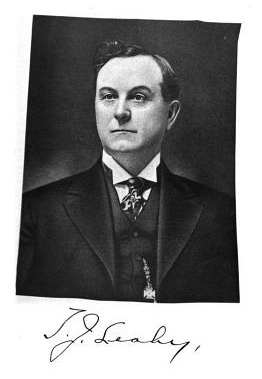Tag: freethought university
-

A Freethought University Alumnus, Irving A. Barker
This is the first item I’ve found on a Freethought University Alumnus. From the “History of Indiana from its Exploration to 1922, Volume 4”, published 1924. Irving A. Barker, well known in Indianapolis as the head of the Barker Coal & Block Company, was born in Decorah, Iowa, January 10, 1872. His public school education…
-

Timothy John Leahy
Timothy Leahy was a brother of M. D. (Maurice) Leahy who founded and was president of the Freethought University at Liberal, Missouri. The University was founded when Leahy was but about 21 years of age and lasted for two years, dissolving due to some falling out with George Walser, and subsequently being unable to maintain…
-

Blue Grass Blade vs. Hough, Pt. 4 : The Truth is Out at Last
Continuing from part 3 with letters and editorials concerning the M. D. Leahy controversy, refuting the Rev. Hough assertion that Freethinker M. D. Leahy, who established the Freethought University, had undergone a Christian conversion. This letter which the Blue Grass Blade published in this September issue is written by M. D. (Maurice) Leahy’s brother, who…
-

Blue Grass Blade Vs. Hough, Pt. 3: Rev. Hough Nailed Down
Continuing from Part 2 in which the Blue Grass Blade had published Hough’s letter in which he had attested M. D. Leahy’s conversion to Christianity. Here is published refutation by a C. E. Alexander. A number of new names are introduced here. First, C. E. Alexander, the individual who introduced Leahy to Freethought and who…
-

Blue Grass Blade vs. Hough Pt. 2 : The Blade Asks for Facts
As seen in Part 1, on June 13 1909 the Blue Grass Blade had published its doubts on the veracity of the Rev. Hough’s account that M. D. Leahy, president of Liberal’s Freethought University, had later converted to Christianity, and that the Freethought University was funded by Col. Robert G. Ingersoll. The Blue Grass Blade…
-

Blue Grass Blade vs. Hough Pt. 1 : A Reckless Assault Upon the Truth
Of Liberal, Missouri and individuals involved, there would of course be attempts to discredit the characters and beliefs of the Freethoughters, and how better to do so than with stories of their renunciation of Freethought upon experiencing Christian conversion. And I’m certain that such conversions did happen for whatever reason. Or were perhaps assumed to…